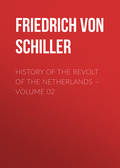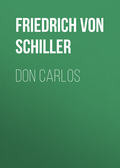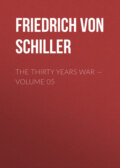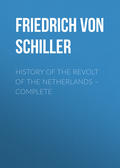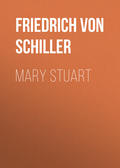
Фридрих Шиллер
The Piccolomini
Forbid it, Heaven, that it should come to this!
Our troops will swell in dreadful fermentation —
The emperor is abused – it cannot be.
ISOLANI
It cannot be; all goes to instant wreck.
WALLENSTEIN
Thou hast said truly, faithful Isolani!
What we with toil and foresight have built up
Will go to wreck – all go to instant wreck.
What then? Another chieftain is soon found,
Another army likewise (who dares doubt it?)
Will flock from all sides to the emperor,
At the first beat of his recruiting drum.
[During this speech, ISOLANI, TERZKY, ILLO, and MARADAS talk
confusedly with great agitation.
MAX. PICCOLOMINI (busily and passionately going from one to another, and soothing them)
Hear, my commander' Hear me, generals!
Let me conjure you, duke! Determine nothing,
Till we have met and represented to you
Our joint remonstrances! Nay, calmer! Friends!
I hope all may yet be set right again.
TERZKY
Away! let us away! in the antechamber
Find we the others.
[They go.
BUTLER (to QUESTENBERG)
If good counsel gain
Due audience from your wisdom, my lord envoy,
You will be cautious how you show yourself
In public for some hours to come – or hardly
Will that gold key protect you from maltreatment.
[Commotions heard from without.
WALLENSTEIN
A salutary counsel – Thou, Octavio!
Wilt answer for the safety of our guest.
Farewell, von Questenberg!
[QUESTENBURG is about to speak.
Nay, not a word.
Not one word more of that detested subject!
You have performed your duty. We know now
To separate the office from the man.
[AS QUESTENBERG is going off with OCTAVIO, GOETZ, TIEFENBACH,
KOLATTO, press in, several other generals following them.
GOETZ
Where's he who means to rob us of our general?
TIEFENBACH (at the same time)
What are we forced to bear? That thou wilt leave us?
KOLATTO (at the same time)
We will live with thee, we will die with thee.
WALLENSTEIN (with stateliness, and pointing to ILLO)
There! the field-marshal knows our will.
[Exit
[While all are going off the stage, the curtain drops
ACT III
SCENE I
A Small Chamber.
ILLO and TERZKY.
TERZKY
Now for this evening's business! How intend you
To manage with the generals at the banquet?
ILLO
Attend! We frame a formal declaration,
Wherein we to the duke consign ourselves
Collectively, to be and to remain
His, both with life and limb, and not to spare
The last drop of our blood for him, provided,
So doing we infringe no oath or duty
We may be under to the emperor. Mark!
This reservation we expressly make
In a particular clause, and save the conscience.
Now hear! this formula so framed and worded
Will be presented to them for perusal
Before the banquet. No one will find in it
Cause of offence or scruple. Hear now further!
After the feast, when now the vapering wine
Opens the heart, and shuts the eyes, we let
A counterfeited paper, in the which
This one particular clause has been left out,
Go round for signatures.
TERZKY
How! think you then
That they'll believe themselves bound by an oath,
Which we have tricked them into by a juggle?
ILLO
We shall have caught and caged them! Let them then
Beat their wings bare against the wires, and rave
Loud as they may against our treachery;
At court their signatures will be believed
Far more than their most holy affirmations.
Traitors they are, and must be; therefore wisely
Will make a virtue of necessity.
TERZKY
Well, well, it shall content me: let but something
Be done, let only some decisive blow
Set us in motion.
ILLO
Besides, 'tis of subordinate importance
How, or how far, we may thereby propel
The generals. 'Tis enough that we persuade
The duke that they are his. Let him but act
In his determined mood, as if he had them,
And he will have them. Where he plunges in,
He makes a whirlpool, and all stream down to it.
TERZKY
His policy is such a labyrinth,
That many a time when I have thought myself
Close at his side, he's gone at once, and left me
Ignorant of the ground where I was standing.
He lends the enemy his ear, permits me
To write to them, to Arnheim; to Sesina
Himself comes forward blank and undisguised;
Talks with us by the hour about his plans,
And when I think I have him – off at once —
He has slipped from me, and appears as if
He had no scheme, but to retain his place.
ILLO
He give up his old plans! I'll tell you, friend!
His soul is occupied with nothing else,
Even in his sleep – they are his thoughts, his dreams,
That day by day he questions for this purpose
The motions of the planets —
TERZKY
Ah! you know
This night, that is now coming, he with Seni,
Shuts himself up in the astrological tower
To make joint observations – for I hear
It is to be a night of weight and crisis;
And something great, and of long expectation,
Takes place in heaven.
ILLO
O that it might take place
On earth! The generals are full of zeal,
And would with ease be led to anything
Rather than lose their chief. Observe, too, that
We have at last a fair excuse before us
To form a close alliance 'gainst the court,
Yet innocent its title, bearing simply
That we support him only in command.
But in the ardor of pursuit thou knowest
Men soon forget the goal from which they started.
The object I've in view is that the prince
Shall either find them, or believe them ready
For every hazard. Opportunity
Will tempt him on. Be the great step once taken,
Which at Vienna's court can ne'er be pardoned,
The force of circumstances will lead him onward
The farther still and farther. 'Tis the choice
That makes him undecisive – come but need,
And all his powers and wisdom will come with it.
TERZKY
'Tis this alone the enemy awaits
To change their chief and join their force with ours.
ILLO
Come! be we bold and make despatch. The work
In this next day or two must thrive and grow
More than it has for years. And let but only
Things first turn up auspicious here below —
Mark what I say – the right stars, too, will show themselves.
Come to the generals. All is in the glow,
And must be beaten while 'tis malleable.
TERZKY
Do you go thither, Illo? I must stay
And wait here for the Countess Terzky. Know
That we, too, are not idle. Break one string,
A second is in readiness.
ILLO
Yes! yes!
I saw your lady smile with such sly meaning.
What's in the wind?
TERZKY
A secret. Hush! she comes.
[Exit ILLO.
SCENE II
The COUNTESS steps out from a closet.
COUNT and COUNTESS TERZKY.
TERZKY
Well – is she coming? I can keep him back
No longer.
COUNTESS
She will be here instantly,
You only send him.
TERZKY
I am not quite certain,
I must confess it, countess, whether or not
We are earning the duke's thanks hereby. You know
No ray has broke out from him on this point.
You have o'erruled me, and yourself know best
How far you dare proceed.
COUNTESS
I take it on me.
[Talking to herself while she is advancing.
Here's no heed of full powers and commissions;
My cloudy duke! we understand each other —
And without words. What could I not unriddle,
Wherefore the daughter should be sent for hither,
Why first he, and no other should be chosen
To fetch her hither? This sham of betrothing her
To a bridegroom9, whom no one knows – No! no!
This may blind others! I see through thee, brother!
But it beseems thee not to draw a card
At such a game. Not yet! It all remains
Mutely delivered up to my finessing.
Well – thou shalt not have been deceived, Duke Friedland,
In her who is thy sister.
SERVANT (enters)
The commanders!
[Exit.
TERZKY (to the COUNTESS)
Take care you heat his fancy and affections —
Possess him with a reverie, and send him,
Absent and dreaming to the banquet; that
He may not boggle at the signature.
COUNTESS
Take care of your guests! Go, send him hither.
TERZKY
All rests upon his undersigning.
COUNTESS (interrupting him)
Go to your guests! Go —
ILLO (comes back)
Where art staying, Terzky?
The house is full, and all expecting you.
TERZKY
Instantly! instantly!
[To the COUNTESS.
And let him not
Stay here too long. It might awake suspicion
In the old man —
COUNTESS
A truce with your precautions!
[Exeunt TERZKY and ILLO.
SCENE III
COUNTESS, MAX. PICCOLOMINI.
MAX. (peeping in on the stage slyly)
Aunt Terzky! may I venture?
[Advances to the middle of the stage, and looks around
him with uneasiness.
She's not here!
Where is she?
COUNTESS
Look but somewhat narrowly
In yonder corner, lest perhaps she lie
Concealed behind that screen.
MAX
There lie her gloves!
[Snatches at them, but the COUNTESS takes them herself.
You unkind lady! You refuse me this,
You make it an amusement to torment me.
COUNTESS
And this the thanks you give me for my trouble?
MAX
O, if you felt the oppression at my heart!
Since we've been here, so to constrain myself
With such poor stealth to hazard words and glances.
These, these are not my habits!
COUNTESS
You have still
Many new habits to acquire, young friend!
But on this proof of your obedient temper
I must continue to insist; and only
On this condition can I play the agent
For your concerns.
MAX
But wherefore comes she not?
Where is she?
COUNTESS
Into my hands you must place it
Whole and entire. Whom could you find, indeed,
More zealously affected to your interest?
No soul on earth must know it – not your father;
He must not, above all.
MAX
Alas! what danger?
Here is no face on which I might concentre
All the enraptured soul stirs up within me.
O lady! tell me, is all changed around me?
Or is it only I?
I find myself,
As among strangers! Not a trace is left
Of all my former wishes, former joys.
Where has it vanished to? There was a time
When even, methought, with such a world as this,
I was not discontented. Now how flat!
How stale! No life, no bloom, no flavor in it!
My comrades are intolerable to me.
My father – even to him I can say nothing.
My arms, my military duties – O!
They are such wearying toys!
COUNTESS
But gentle friend!
I must entreat it of your condescension,
You would be pleased to sink your eye, and favor
With one short glance or two this poor stale world,
Where even now much, and of much moment,
Is on the eve of its completion.
MAX
Something,
I can't but know is going forward round me.
I see it gathering, crowding, driving on,
In wild uncustomary movements. Well,
In due time, doubtless, it will reach even me.
Where think you I have been, dear lady? Nay,
No raillery. The turmoil of the camp,
The spring-tide of acquaintance rolling in,
The pointless jest, the empty conversation,
Oppressed and stifled me. I gasped for air —
I could not breathe – I was constrained to fly,
To seek a silence out for my full heart;
And a pure spot wherein to feel my happiness.
No smiling, countess! In the church was I.
There is a cloister here "To the heaven's gate,"10 Thither I went, there found myself alone.
Over the altar hung a holy mother;
A wretched painting 'twas, yet 'twas the friend
That I was seeking in this moment. Ah,
How oft have I beheld that glorious form
In splendor, 'mid ecstatic worshippers;
Yet, still it moved me not! and now at once
Was my devotion cloudless as my love.
COUNTESS
Enjoy your fortune and felicity!
Forget the world around you. Meantime, friendship
Shall keep strict vigils for you, anxious, active.
Only be manageable when that friendship
Points you the road to full accomplishment.
MAX
But where abides she then? Oh, golden time
Of travel, when each morning sun united
And but the coming night divided us;
Then ran no sand, then struck no hour for us,
And time, in our excess of happiness,
Seemed on its course eternal to stand still.
Oh, he hath fallen from out his heaven of bliss
Who can descend to count the changing hours,
No clock strikes ever for the happy!
COUNTESS
How long is it since you declared your passion?
MAX
This morning did I hazard the first word.
COUNTESS
This morning the first time in twenty days?
MAX
'Twas at that hunting-castle, betwixt here
And Nepomuck, where you had joined us, and
That was the last relay of the whole journey;
In a balcony we were standing mute,
And gazing out upon the dreary field
Before us the dragoons were riding onward,
The safeguard which the duke had sent us – heavy;
The inquietude of parting lay upon me,
And trembling ventured at length these words:
This all reminds me, noble maiden, that
To-day I must take leave of my good fortune.
A few hours more, and you will find a father,
Will see yourself surrounded by new friends,
And I henceforth shall be but as a stranger,
Lost in the many – "Speak with my Aunt Terzky!"
With hurrying voice she interrupted me.
She faltered. I beheld a glowing red
Possess her beautiful cheeks, and from the ground
Raised slowly up her eye met mine – no longer
Did I control myself.
[The Princess THEKLA appears at the door, and remains standing, observed by the COUNTESS, but not by PICCOLOMINI.
With instant boldness
I caught her in my arms, my lips touched hers;
There was a rustling in the room close by;
It parted us – 'Twas you. What since has happened
You know.
COUNTESS (after a pause, with a stolen glance at THEKLA)
And is it your excess of modesty
Or are you so incurious, that you do not
Ask me too of my secret?
MAX
Of your secret?
COUNTESS
Why, yes! When in the instant after you
I stepped into the room, and found my niece there;
What she in this first moment of the heart
Taken with surprise —
MAX. (with eagerness)
Well?
SCENE IV
THEKLA (hurries forward), COUNTESS, MAX. PICCOLOMINI.
THEKLA (to the COUNTESS)
Spare yourself the trouble:
That hears he better from myself.
MAX. (stepping backward)
My princess!
What have you let her hear me say, Aunt Terzky?
THEKLA (to the COUNTESS)
Has he been here long?
COUNTESS
Yes; and soon must go,
Where have you stayed so long?
THEKLA
Alas! my mother,
Wept so again! and I – I see her suffer,
Yet cannot keep myself from being happy.
MAX
Now once again I have courage to look on you.
To-day at noon I could not.
The dazzle of the jewels that played round you
Hid the beloved from me.
THEKLA
Then you saw me
With your eye only – and not with your heart?
MAX
This morning, when I found you in the circle
Of all your kindred, in your father's arms,
Beheld myself an alien in this circle,
O! what an impulse felt I in that moment
To fall upon his neck, to call him father!
But his stern eye o'erpowered the swelling passion,
It dared not but be silent. And those brilliants,
That like a crown of stars enwreathed your brows,
They scared me too! O wherefore, wherefore should be
At the first meeting spread as 'twere the ban
Of excommunication round you, – wherefore
Dress up the angel as for sacrifice.
And cast upon the light and joyous heart
The mournful burden of his station? Fitly
May love dare woo for love; but such a splendor
Might none but monarchs venture to approach.
THEKLA
Hush! not a word more of this mummery;
You see how soon the burden is thrown off.
[To the COUNTESS.
He is not in spirits. Wherefore is he not?
'Tis you, aunt, that have made him all so gloomy!
He had quite another nature on the journey —
So calm, so bright, so joyous eloquent.
[To MAX.
It was my wish to see you always so,
And never otherwise!
MAX
You find yourself
In your great father's arms, beloved lady!
All in a new world, which does homage to you,
And which, were't only by its novelty,
Delights your eye.
THEKLA
Yes; I confess to you
That many things delight me here: this camp,
This motley stage of warriors, which renews
So manifold the image of my fancy,
And binds to life, binds to reality,
What hitherto had but been present to me
As a sweet dream!
MAX
Alas! not so to me.
It makes a dream of my reality.
Upon some island in the ethereal heights
I've lived for these last days. This mass of men
Forces me down to earth. It is a bridge
That, reconducting to my former life,
Divides me and my heaven.
THEKLA
The game of life
Looks cheerful, when one carries in one's heart
The unalienable treasure. 'Tis a game,
Which, having once reviewed, I turn more joyous
Back to my deeper and appropriate bliss.
[Breaking off, and in a sportive tone.
In this short time that I've been present here.
What new unheard-of things have I not seen;
And yet they all must give place to the wond
Which this mysterious castle guards.
COUNTESS (recollecting)
And what
Can this be then? Methought I was acquainted
With all the dusky corners of this house.
THEKLA (smiling)
Ay, but the road thereto is watched by spirits,
Two griffins still stand sentry at the door.
COUNTESS (laughs)
The astrological tower! How happens it
That this same sanctuary, whose access
Is to all others so impracticable,
Opens before you even at your approach?
THEKLA
A dwarfish old man with a friendly face
And snow-white hairs, whose gracious services
Were mine at first sight, opened me the doors.
MAX
That is the duke's astrologer, old Seni.
THEKLA
He questioned me on many points; for instance,
When I was born, what month, and on what day,
Whether by day or in the night.
COUNTESS
He wished
To erect a figure for your horoscope.
THEKLA
My hand too he examined, shook his head
With much sad meaning, and the lines, methought,
Did not square over truly with his wishes.
COUNTESS
Well, princess, and what found you in this tower?
My highest privilege has been to snatch
A side-glance, and away!
THEKLA
It was a strange
Sensation that came o'er me, when at first
From the broad sunshine I stepped in; and now
The narrowing line of daylight, that ran after
The closing door, was gone; and all about me
'Twas pale and dusky night, with many shadows
Fantastically cast. Here six or seven
Colossal statues, and all kings, stood round me
In a half-circle. Each one in his hand
A sceptre bore, and on his head a star;
And in the tower no other light was there
But from these stars all seemed to come from them.
"These are the planets," said that low old man,
"They govern worldly fates, and for that cause
Are imaged here as kings. He farthest from you,
Spiteful and cold, an old man melancholy,
With bent and yellow forehead, he is Saturn.
He opposite, the king with the red light,
An armed man for the battle, that is Mars;
And both these bring but little luck to man."
But at his side a lovely lady stood,
The star upon her head was soft and bright,
Oh, that was Venus, the bright star of joy.
And the left hand, lo! Mercury, with wings
Quite in the middle glittered silver bright.
A cheerful man, and with a monarch's mien;
And this was Jupiter, my father's star
And at his side I saw the Sun and Moon.
MAX
Oh, never rudely will I blame his faith
In the might of stars and angels. 'Tis not merely
The human being's pride that peoples space
With life and mystical predominance;
Since likewise for the stricken heart of love
This visible nature, and this common world,
Is all too narrow; yea, a deeper import
Lurks in the legend told my infant years
Than lies upon that truth, we live to learn.
For fable is love's world, his home, his birth-place;
Delightedly dwells he among fays and talismans,
And spirits; and delightedly believes
Divinities, being himself divine
The intelligible forms of ancient poets,
The fair humanities of old religion,
The power, the beauty, and the majesty,
That had her haunts in dale, or piny mountain,
Or forest by slow stream, or pebbly spring,
Or chasms, and watery depths, all these have vanished.
They live no longer in the faith of reason!
But still the heart doth need a language, still
Doth the old instinct bring back the old names;
And to yon starry world they now are gone,
Spirits or gods, that used to share this earth
With man as with their friend11, and to the lover
Yonder they move, from yonder visible sky
Shoot influence down: and even at this day
'This Jupiter who brings whate'er is great,
And Venus who brings everything that's fair!
THEKLA
And if this be the science of the stars,
I, too, with glad and zealous industry,
Will learn acquaintance with this cheerful faith.
It is a gentle and affectionate thought,
That in immeasurable heights above us,
At our first birth, the wreath of love was woven,
With sparkling stars for flowers.
COUNTESS
Not only roses
And thorns too hath the heaven, and well for you
Leave they your wreath of love inviolate:
What Venus twined, the bearer of glad fortune,
The sullen orb of Mars soon tears to pieces.
MAX
Soon will this gloomy empire reach its close.
Blest be the general's zeal: into the laurel
Will he inweave the olive-branch, presenting
Peace to the shouting nations. Then no wish
Will have remained for his great heart. Enough
Has he performed for glory, and can now
Live for himself and his. To his domains will
He retire; he has a stately seat
Of fairest view at Gitschin, Reichenberg,
And Friedland Castle, both lie pleasantly;
Even to the foot of the huge mountains here
Stretches the chase and covers of his forests:
His ruling passion to create the splendid
He can indulge without restraint; can give
A princely patronage to every art,
And to all worth a sovereign's protection.
Can build, can plant, can watch the starry courses —
COUNTESS
Yet I would have you look, and look again,
Before you lay aside your arms, young friend!
A gentle bride, as she is, is well worth it,
That you should woo and win her with the sword.
MAX
Oh, that the sword could win her!
COUNTESS
What was that?
Did you hear nothing? Seemed as if I heard
Tumult and larum in the banquet-room.
[Exit COUNTESS.



